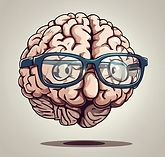
A Focused Mind
The ADHD Specialty Clinic of Dr. Lauren Kacir, M.D.
Let's get focused!
ADHD in Adults
ADHD in adults is a diagnosis in flux. In the United States it is defined by the American Psychiatric Association as "Residual ADHD" and some experts will not diagnose ADHD in people without getting elementary school records that prove symptoms were present before age 7. Most specialists, however, believe that symptoms of ADHD can become bothersome at any age and it is currently thought that 4.4% of adults in the United States can be diagnosed with ADHD. Only a small portion of these adults are receiving treatment.
Adults with "classic" ADHD may be less hyperactive than they were as children, but they are still impulsive and inattentive enough to have problems. We used to diagnose them with three questions: How many jobs have you held? How many times have you been married? How many speeding tickets have you received? If your answers added up to more than 5, you had ADHD!
Now the diagnosis is more disciplined. There are lists of symptoms that have been adapted from those appearing in children. For instance, instead of asking if an adult runs and climbs while others are waiting quietly, we now ask about an inner feeling of restlessness and a need to pace after a period of time spent sitting still.
The key to determining whether an adult needs treatment for ADHD lies in whether the symptoms are interfering in two aspects of life. For this reason, we frequently see adult patients after the birth of a child, even if their job responsibilities haven't changed. The additional demands of parenting added to those of their employment are too much to continue performing at peak levels in either domain.
Conversely, if someone is promoted to a management position, the change in their duties may result in difficulties at home as well. Even a shift in the hours worked can result in more ADHD symptoms and a new diagnosis.
The good news is that there are treatments available that work as well in adults as they do in children. Furthermore, adults are much better at deciding whether a given intervention is worth the effort it involves. Finally, adults have more control over their environments, so that it may be possible to eliminate or modify the stressors resulting in ADHD impairment.